TAXANGLES A newsletter for proactive planning... In this edition... November 2020 Issue www.compassaccountants.co.uk Home working equipment and returning to the office. Paying back deferred VAT Employment allowance - have you claimed it? Employees, can you claim tax relief for expenses of working from home? Annual investment allowance - beware the transitional rules PLUS... A Client Focus interview with CEO of The Portsmouth Guildhall, Andy Grays

PAGE 2 Homeworking equipment and returning to the office Before the Government U-turn, many employees had started to return to office-based jobs. Where the employee had previously worked from home and had been provided with home working equipment, there may be tax implications to consider if the employee is allowed to keep the equipment for personal use. The tax implications will depend on the way in which the equipment was made available to the employee. Employer provided the equipment If the employer provided equipment to enable the employee to work from home, no tax charge arises in respect of the provision, as long as the main reason for providing the employment was to enable the employee to work from home, any private use is insignificant and the employer retains ownership of the equipment. This remains the case if the employee retains the equipment to enable them to work from home on a more flexible basis. If, at the end of the working from home period, the employee simply hands back the homeworking equipment to the employer, there are no tax implications. However, if ownership of the equipment is transferred to the employee, there will be tax to pay unless the employee pays at least the market value at the date of transfer for the equipment. The amount charged to tax is the market value of the equipment at the date of transfer, less any contribution from the employee. Employer reimburses the cost of the equipment At the start of lockdown, many employees were required to work from home at very short notice. As a result, it was often easier for the employee to buy their homeworking equipment, and the employer to reimburse the cost. The reimbursement is tax-free as long as the employee acquired the equipment to allow them to work from home and any private use is insignificant. However, if the employee buys the equipment, the title remains with the employee (unless it is transferred to the employer as a condition of the reimbursement). Consequently, if the employee no longer needs to work from home when they return to the office, but keeps the equipment for personal use, there is no tax charge – the employee is simply keeping equipment they already own. Employee buys equipment If the employee buys their own homeworking equipment and the employer does not meet the cost, the employee can claim tax relief for their expenditure. If the employee uses the equipment personally once they return to the office, there are no associated tax implications as the employee already owns the equipment.
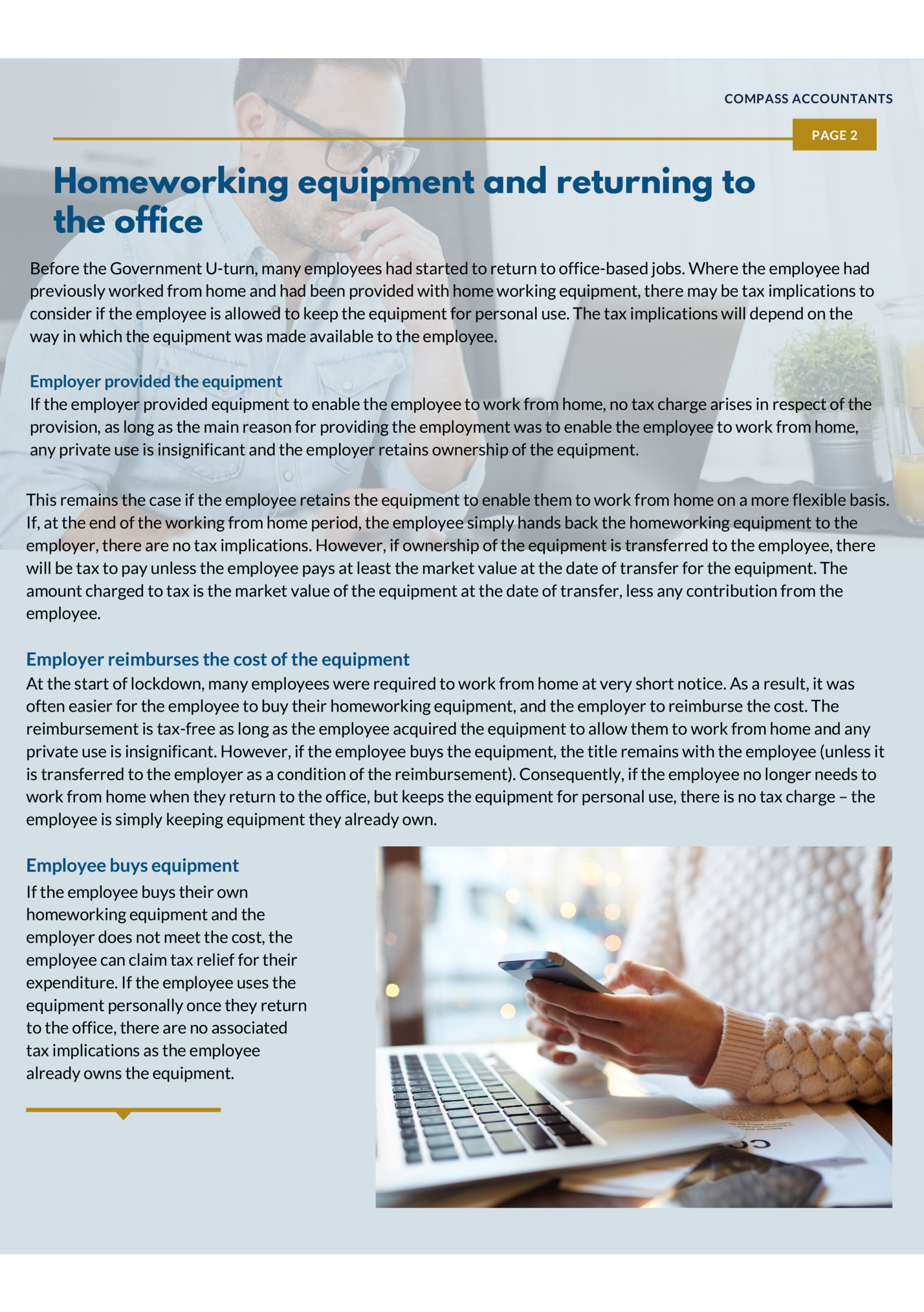
PAGE 3 Paying back deferred VAT Paying back deferred VAT At the start of lockdown, the Government announced a number of measures to help businesses weather the pandemic. One of those measures was the option for VATregistered businesses to defer VAT payments that fell due between 20 March 2020 and 30 June 2020. This window meant payment of VAT for the following quarters could be deferred: · quarter to 29 February 2020 – due by 7 April 2020; · quarter to 31 March 2020 – due by 7 May 2020; and · quarter to 30 April 2020 - due by 7 June 2020. However, businesses opting to defer payments were still required to file their VAT returns on time. VAT due after 30 June 2020 Normal service is resumed in respect of VAT which falls due after 30 June 2020. This must be paid on full and on time. Consequently, VAT for the quarter to 31 May 2020 must be paid by 7 July 2020, even if the trader has yet to pay their VAT for the quarter to 29 February 2020. This applies for successive VAT quarters too. Set up cancelled direct debits Where VAT is normally paid by direct debit but the direct debit was cancelled to enable the trader to take advantage of the deferral option, the direct debit needs to be set up again so that payments can be taken automatically. If this has not yet been done, payments will need to be triggered manually to ensure that VAT reaches HMRC on time until the direct debit is back up and running. Paying VAT that has been deferred Deferred VAT remains due – the measure simply provides a longer payment window; it does not cancel the liability. VAT that fell due in the period from 20 March 2020 to 30 June 2020 was originally due to be paid in full by 31 March 2021. However, in delivering his Winter Economy Plan on 24 September 2020, the Chancellor, Rishi Sunak, announced that instead, he will allow businesses to spread the repayment of deferred VAT over 11 smaller repayments during 2020/21, with no interest to pay. Struggling to pay? Businesses in certain sectors, such as hospitality and leisure, are still not able to operate normally. Where, despite the longer repayment period, a business thinks that it may struggle to repay its deferred VAT, it should contact HMRC to set up a time to pay agreement, which can spread the repayments over a longer period. This should be done before the first payment becomes due.
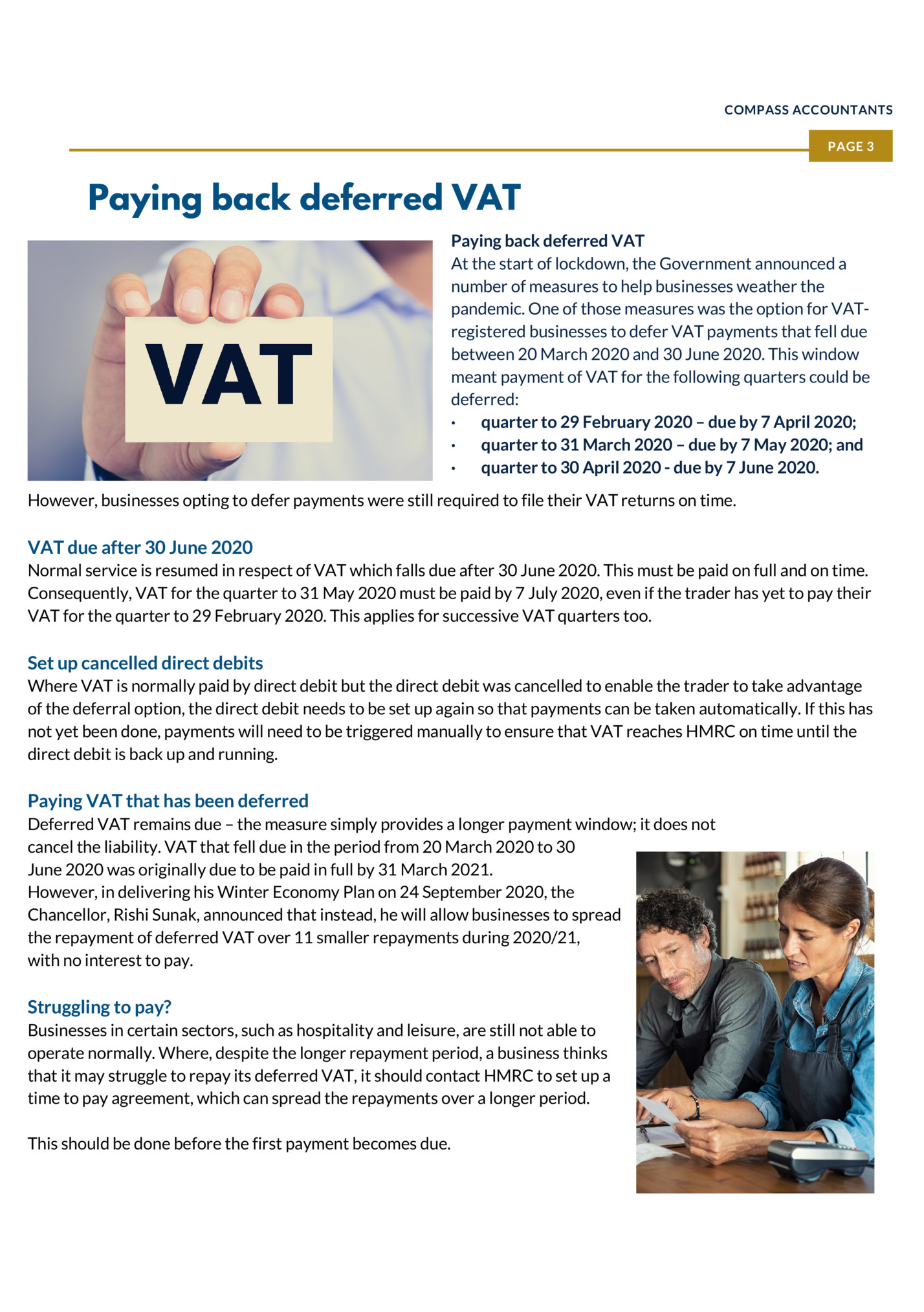
PAGE 4 Employment allowance- Have you claimed it? The National Insurance employment allowance enables eligible employers to reduce the amount of employer’s National Insurance that they pay over to HMRC. The allowance, which is set at £4,000 for 2020/21, is available to most employers whose Class 1 National Insurance liability was less than £100,000 in 2019/20, with some notable exceptions, including companies where the sole employee is also a director. The employment allowance must be claimed, but this can be done at any point in the tax year. There is no obligation to claim the allowance from the start of the tax year. The allowance is set against employer’s Class 1 National Insurance until it is used up. It cannot be used against Class 1A or Class 1B liabilities, or to reduce the amount of National Insurance payable by employees. Employment allowance and the CJRS The Coronavirus Job Retention Scheme (CJRS) enabled employers to place employees on furlough and claim a grant from the Government to pay them furlough pay of 80% of their wages (capped at £2,500 per month) while on furlough. Payments made to furloughed employees are liable for tax and Class 1 National Insurance as for usual payments of wages and salary. For pay periods up to an including 31 July 2020, employers were able to claim the associated employer’s National Insurance on grant payments, to the extent that it was not covered by the employment allowance. This meant that if an employer had claimed the employment allowance form the start of the tax year, they would not be able to reclaim the associated National Insurance on grant payments until the employment allowance had been used up. By contrast, employers who delayed claiming the employment allowance could reclaim the employer’s National Insurance on grant payments from the Government under the CJRS and use the employment allowance against their secondary liability once the reclaim option came to an end. This was a beneficial strategy and one that HMRC have not raised objections to. Remember to claim If the employment allowance was not claimed at the start of the tax year to make the most of the CJRS, and has still not been claimed, eligible employers should now look to claim the allowance so that they can benefit from it. The allowance must be claimed each year – claims do not roll forward automatically. HMRC guidance confirms that claims can be made ‘at any time in the tax year’. Claims can be made via the payroll software. Late claims If the claim is made late in the tax year and the full amount of the available employment allowance (set at the lower of £4,000 and your employer Class 1 National Insurance liability for the year) is not used, any unclaimed allowance at the end of the year to pay any tax (including VAT and corporation tax) or National Insurance that you owe. Where no tax is paid, the employer can ask HMRC for a refund. Employers can check their HMRC online account to see how much of their employment allowance for the year they have used. Where the employment allowance has not been claimed for previous years, claims can be made retrospectively for the previous four tax years.
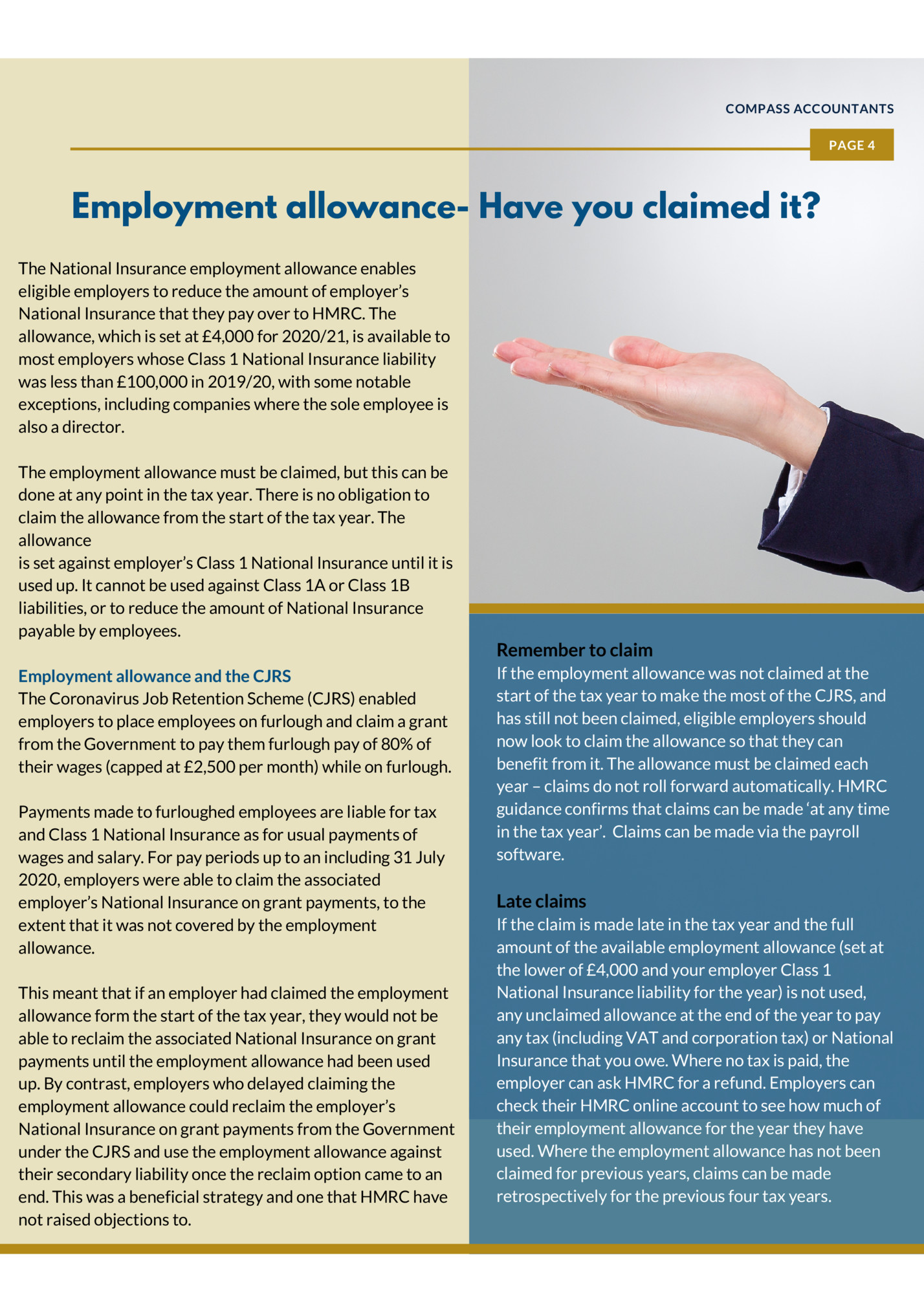
PAGE 5 Employees, can you claim tax relief for expenses of working from home? The Covid 19 pandemic has meant that more employees worked from home than ever before. This trend looks set to continue following the Government’s latest advice to continue to work from home where you can do so. Further, many business plan to embrace flexible working beyond the end of the pandemic, allowing employees to work from home some or all of the time where their job allows this. However, while working from home may save the cost of the commute, there are expenses associated with working from home. Is the employee able to claim tax relief where these are not met by the employer? Additional household expenses As a result of working from home, an employee will incur the cost of additional household expenses, such as additional electricity and gas costs, additional cleaning costs, and such like. During the Covid-19 pandemic, HMRC confirmed that employees are able to claim a deduction for additional household expenses attributable to working from home of £6 per week without supporting evidence. Where the actual additional costs are more than £6 per week, tax relief can be claimed for the full amount, as long as the employee can substantiate the claim. For example, this could be done by comparing bills prior to working from home with those during the working at home period. Homeworking equipment Employees may have needed to buy office equipment, such as a computer and a printer, to enable them to work from home. Where these costs are not reimbursed by the employer, HMRC have confirmed that employee can claim a tax deduction for the actual expenditure incurred, as long as it was incurred ‘wholly, exclusively and necessarily’ in the performance of the duties of the employment. Other expenses To claim relief for other expenses employees will need to pass the general test that the expense was incurred ‘wholly, necessarily and exclusively’ in the performance of the duties of the employment. Care must be taken to distinguish between expenditure which puts the employee in the position to do their job as opposed to being incurred in the performance of it. Childcare, for example, would fall into the former category. Relief is also denied for dual purpose expenditure, such as an office chair which enables the employee to be comfortable while working, as this fails the ‘exclusively’ part of the test. Making claims Where the conditions for tax relief are met, a deduction can be claimed on form P87 (available on the Gov.uk website) or, where the employee completes a tax return, on the employment pages of the return.
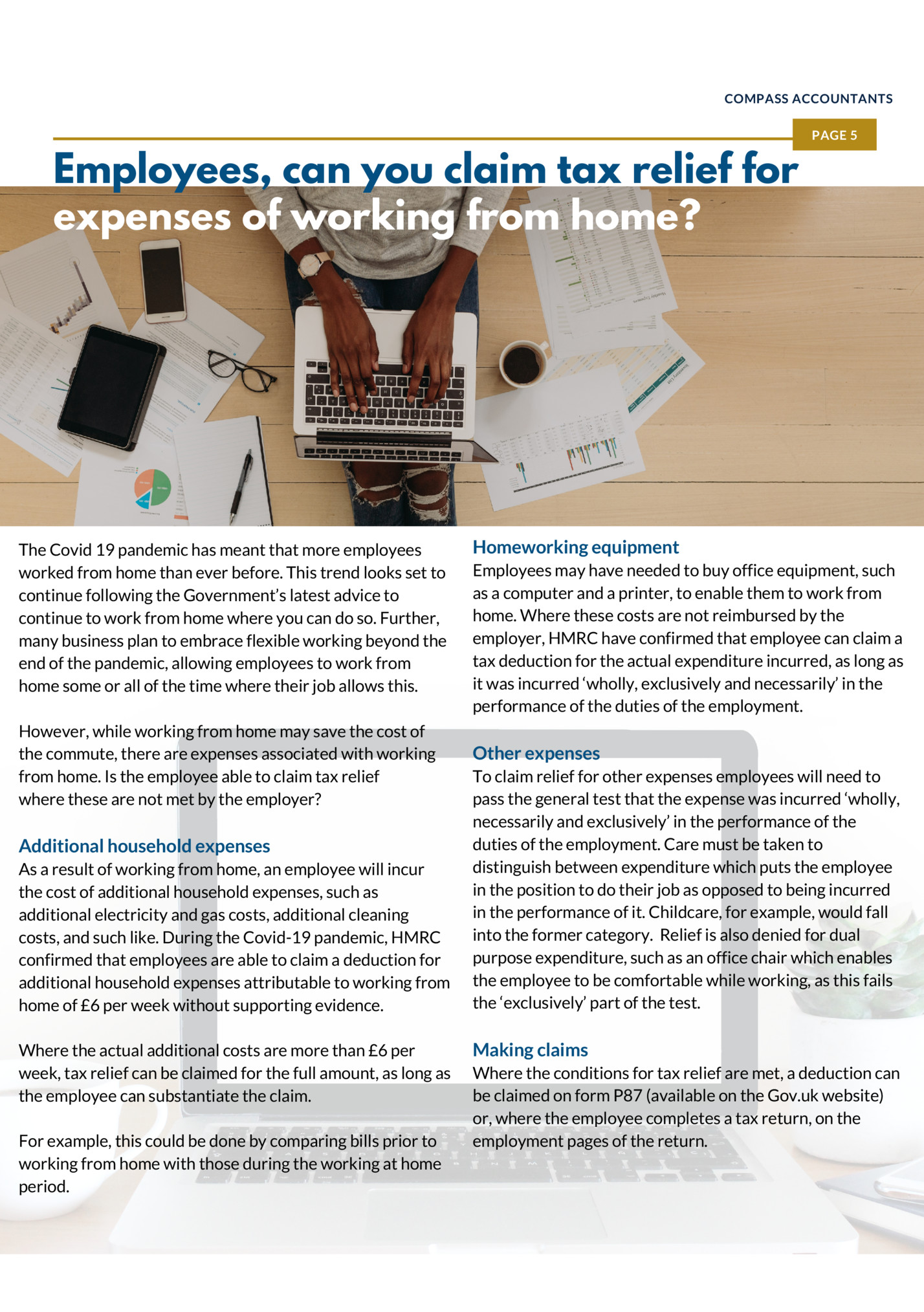
CLIENT FOCUS: The Portsmouth Guildhall In this Client Focus, we catch up with the CEO of Portsmouth Guildhall, Andy Grays, and learn about the impact Covid-19 has had on The Portsmouth Guildhall, and the cultural and entertainment industry in general. *(This article was drafted prior to the second national lockdown) As a registered charity and venue that attracts almost a quarter of a million people annually, The Portsmouth Guildhall is known mostly for its performances, art and general entertainment, but in recent years, it has also established itself as a major business and conference venue. However, in March 2020, like many businesses across the UK, The Portsmouth Guildhall faced one of its greatest challenges yet, as the Covid-19 pandemic caused a vast number of its events to be cancelled.

PAGE 8 Andy Grays, the CEO of The Guildhall Trust, explains, “The entertainment industry wasn’t quite ready to accept the scale of the impact at first. Initially, many people were bullish and thought this would simply cause a short closure and that we would all be up and running by autumn, but of course, they were wrong.” However, in March 2020, like many businesses across the UK, The Portsmouth Guildhall faced one of its greatest challenges yet, as the Covid-19 pandemic caused a vast number of its events to be cancelled. Andy Grays, the CEO of The Guildhall Trust, explains, “The entertainment industry wasn’t quite ready to accept the scale of the impact at first. Initially, many people were bullish and thought this would simply cause a short closure and that we would all be up and running by autumn, but of course, they were wrong.” “In total, we were forced to reschedule as many as 30 events including performances, conferences, dinners and even weddings. This included a sell-out Riverdance show that was scheduled to run for four nights. All customers were offered the option of either rescheduling their bookings, or being refunded, but most were happy to sit on their tickets. Only around 5% wanted a refund, which was extremely helpful as it was a difficult few months.” The show goes on… After the national lockdown, when social restrictions were loosened, the doors were opened to the public once again. An extensive range of measures were put in place and guidelines were laid out to ensure the wellbeing of the Guildhall’s visitors. This included mask wearing, sanitisation, reduced capacity, enhanced cleaning procedures, reconfigured seating, one-way systems, temperature checks, Track and Trace and much more. “Things have certainly changed.” said Andy, “We are now booking less of the larger musical performances that require a higher level of production and are more logistically complex, that have ancillary staff and are standing only. Seated audiences are essential now, so naturally, acts like stand-up comedy are certainly on the increase. For example, we recently secured a late Jimmy Carr performance for December -which we were incredibly pleased with- and this has been a hugely popular booking. We have also seen great confidence in terms of bookings for 2021 and even as far as a year ahead. For example, we have a date for Kathrine Ryan in 2022 that is already selling out fast.” Back to business Whilst the Guildhall got back on its feet for shows and performances, it also made progress as a venue for business and conference hire, an integral element of its offering. “Back in 2013, we created a business plan to make the venue more attractive to organisations looking for a conference facility.” adds Andy, “We developed our space and now have a vast range of meeting spaces available to accommodate between 2 and 2000 delegates, for all types of events and budgets. Having recently reached out to The University of Portsmouth, we are now pleased to say that we have developed an exciting new partnership that will allow them to temporarily use the Guildhall as a teaching space. This will help them to create a Covidsecure face to face teaching environment and will enable them to host small student events until December.” The future With more and more performance dates on the calendar for 2021, and additional bookings for the Guildhall as a conference venue, the future is certainly looking brighter. “I feel a lot happier today, in October, than I did back in April.” said Andy, “We were looking at huge losses which we mitigated against by applying for and receiving funding, and by looking at alternatives. We’ve made a huge difference to our forecasted outcome this year.” The Guildhall Trust (the charitable organisation which manages Portsmouth Guildhall) was awarded £215,000 as part of the Government’s £1.57 billion Culture Recovery Fund (CRF) to help face the challenges of the coronavirus pandemic and to ensure it has a sustainable future. University of Portsmouth
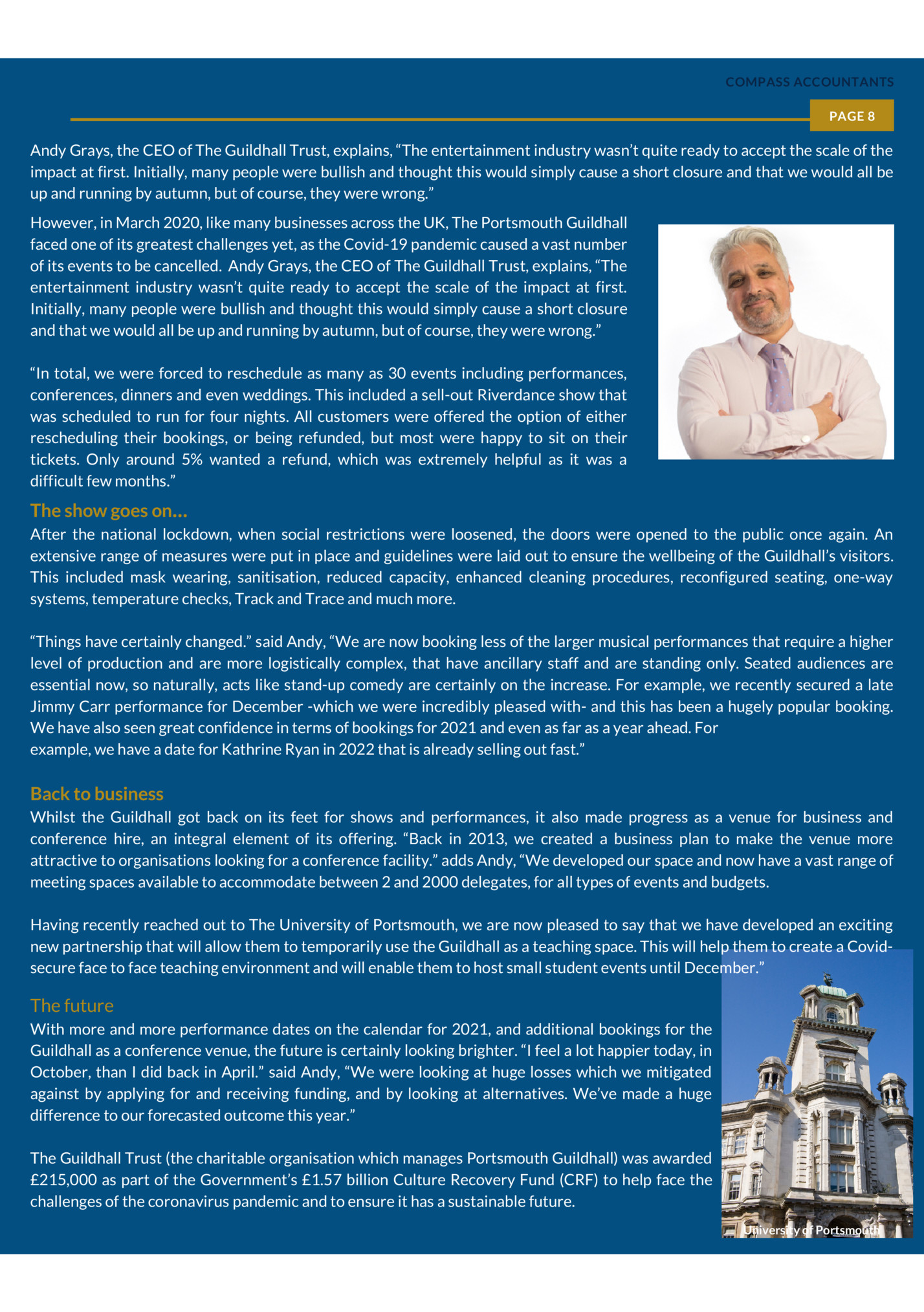
COMPASS ACCOUNTANTS PAGE 9 PAGE 9 “Moving forward, I’m confident we’ll come out reasonably well, but to return to our normal level of turnover will take us somewhere around the two-year mark to recover. I do, however, predict that we will see a huge surge in creativity, new material, new productions and artists, as well as a massive increase in the demand for cultural events, as both audiences and artists will really have felt the absence of art, performance and culture in their lives. People will be very keen to get out and experience such events. We saw something similar after the 2012 Olympics, when entertainment was briefly held back, and I expect the same to happen, but on a much bigger scale.” Working with Compass… Compass Accountants have worked with The Portsmouth Guildhall for a year now, but during the pandemic, Compass provided further support after a staff member left the finance department. “The Compass team have been a pleasure to work with,” said Andy. “They completed an audit for us, and the process was very smooth. During the early stages of Covid, we also used Compass to support our team as our Director of Finance had left and we had quite a junior finance team in place at the time. They were always available to offer advice and have been excellent in helping with anything we needed support with.” “The way the audit was carried out and the advice Compass gave us, allowed us to deal with problematic areas, and to be able to work with our accounts team here. We were able to look at what the chancellor had offered and how best to furlough staff. The advice and support was always there for us.” To support The Portsmouth Guildhall, check out the ‘What’s On’ pages on the website for future months: www.portsmouthguildhall.org.uk If you would like to support the Portsmouth Guildhall though membership or individual giving- click here If you are interested in finding out more about the Portsmouth Guildhall as a business or conference venue – click here
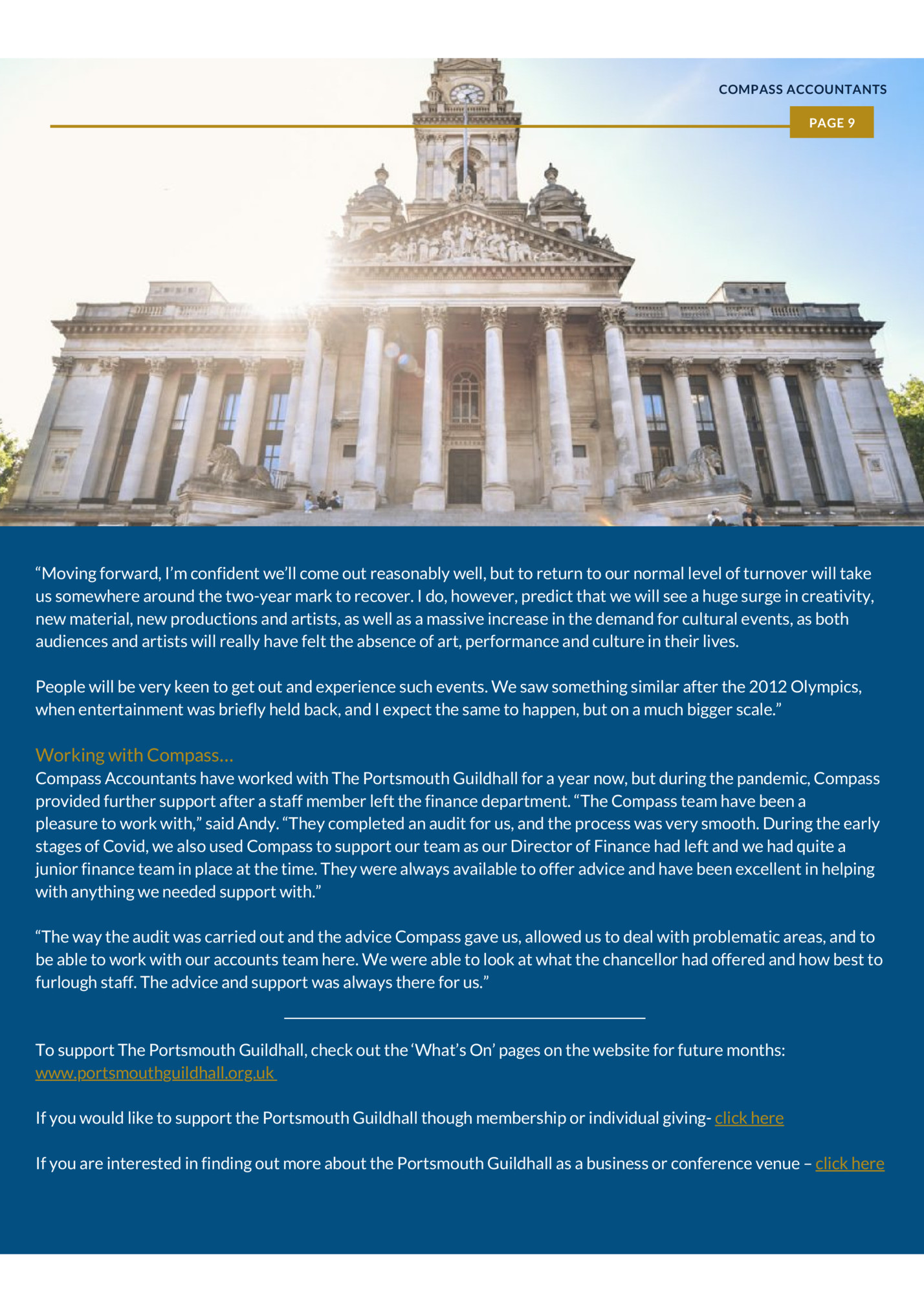
PAGE 10 TAX DIARY October/November 2020 1 October 2020 – Due date for payment of Corporation Tax for period ended 31 December 2019 5 October 2020 – Deadline for Self Assessment registration to notify chargeability of Income Tax/Capital Gains Tax for 2019/20 7 October 2020 – Deadline for VAT returns and payments of Accounting Quarter period ending 31 August 2020 14 October 2020 – Income tax due date for CT61 period to 30 September 2020 19 October 2020 – Monthly deadline for postal payments of CIS, NICs and PAYE to HMRC 22 October 2020 – Monthly deadline for electronic remittance of CIS, NICs and PAYE to HMRC 31 October 2020 – Deadline for postal submission of Self Assessment tax returns for tax year ended 5 April 2020 to be received by HMRC 1 November 2020 – Due date for payment of Corporation Tax for period ended 31 January 2020 2 November 2020 – Deadline for submitting P46 (Car) for quarter ending 5 October 2020 7 November 2020 – Deadline for VAT returns and payments of Accounting Quarter period ending 30 September 2020 19 November 2020 – Monthly deadline for postal payments of CIS, NICs and PAYE to HMRC 22 November 2020 – Monthly deadline for electronic remittance of CIS, NICs and PAYE to HMRC For further information on any of the stories in this month’s newsletter, or for any other matter that Compass Accountants can assist you with, please contact us on 01329 844145 or contact@compassaccountants.co.uk Compass Accountants, Venture House, The Tanneries, East Street, Titchfield Hampshire. PO14 4AR
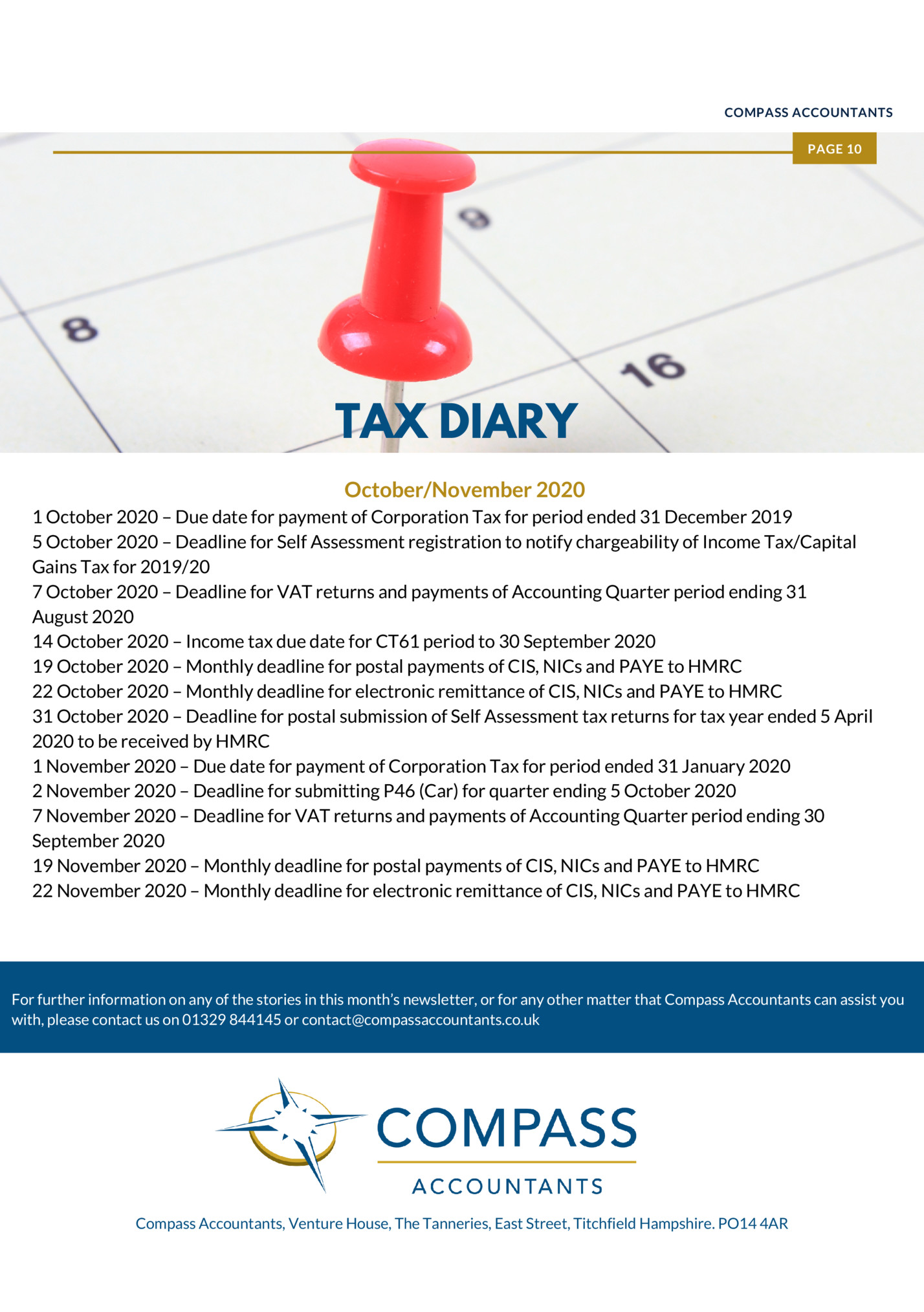
Fleepit Digital © 2021